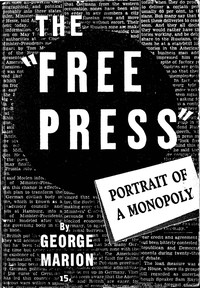The "free press" : portrait of a monopoly by George Marion
"The 'Free Press': Portrait of a Monopoly" by George Marion is a critical examination of the American press as a quasi-monopolistic entity written in the mid-20th century. This book discusses the inherent inequalities in media access, portraying journalism as a vehicle primarily serving the interests of a wealthy elite rather than the general public. Marion argues that true freedom of the press is skewed—predominantly available to those with financial means. In this
pamphlet, Marion breaks down the structures and dynamics of media ownership and its impact on the dissemination of information. He emphasizes how a small number of wealthy individuals control the majority of the press, shaping public opinion and limiting the diversity of viewpoints presented in the media. The author explores historical developments, such as the formation of major news agencies and their monopolistic tendencies, alongside the regulatory and economic challenges faced by alternative, less-funded publications. Ultimately, he calls for greater awareness and action to challenge this monopoly, urging labor movements and progressives to work towards establishing a more equitable press that genuinely represents the voices of the broader populace. (This is an automatically generated summary.)
Read or download for free
| How to read | Url | Size | |||
|---|---|---|---|---|---|
| Read now! | https://www.gutenberg.org/ebooks/70107.html.images | 132 kB | |||
| EPUB3 (E-readers incl. Send-to-Kindle) | https://www.gutenberg.org/ebooks/70107.epub3.images | 818 kB | |||
| EPUB (older E-readers) | https://www.gutenberg.org/ebooks/70107.epub.images | 816 kB | |||
| EPUB (no images, older E-readers) | https://www.gutenberg.org/ebooks/70107.epub.noimages | 561 kB | |||
| Kindle | https://www.gutenberg.org/ebooks/70107.kf8.images | 1.3 MB | |||
| older Kindles | https://www.gutenberg.org/ebooks/70107.kindle.images | 1.2 MB | |||
| Plain Text UTF-8 | https://www.gutenberg.org/ebooks/70107.txt.utf-8 | 115 kB | |||
| Download HTML (zip) | https://www.gutenberg.org/cache/epub/70107/pg70107-h.zip | 629 kB | |||
| There may be more files related to this item. | |||||
Similar Books
About this eBook
| Author | Marion, George, 1905-1955 |
|---|---|
| LoC No. | 46005997 |
| Title | The "free press" : portrait of a monopoly |
| Original Publication | United States: New Century Publishers, 1946. |
| Note | Reading ease score: 54.9 (10th to 12th grade). Somewhat difficult to read. |
| Credits | Tim Lindell, Charlie Howard, and the Online Distributed Proofreading Team at https://www.pgdp.net (This book was produced from images made available by the HathiTrust Digital Library.) |
| Language | English |
| LoC Class | PN: Language and Literatures: Literature: General, Criticism, Collections |
| Subject | Press -- United States |
| Category | Text |
| EBook-No. | 70107 |
| Release Date | Feb 22, 2023 |
| Copyright Status | Public domain in the USA. |
| Downloads | 187 downloads in the last 30 days. |
| Project Gutenberg eBooks are always free! | |


